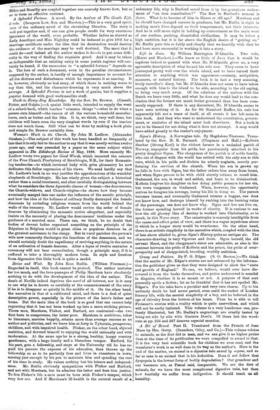Strive and Wait. By John Rose Bain. (William Freeman.)— Regarded
in itself, this book cannot be praised. The author narrates far too much, and the love-passages of Philip Marsham have absolutely nothing -to do with the development of the idea of the author. The death of Neville indeed deprives the novel of all interest, nor is it easy to see why he is drawn so carefully at the commencement of the story if he is to disappear so quietly in the middle of it. On the other hand, the• narrative is that of a cultivated mind, and there is a deal of quiet descriptive power, especially in the picture of the hero's father and home. But the main idea of the book is so good that one cannot help regretting that it has not been worked up into a- more striking picture. Three men, Marsham, Fluke; and Burford, are contrasted—the two first born to competence, the latter poor. Marsham is ambitions, takes to literature, marries happily, attains more than average success as an author and politician, and we leave him at forty in Tyburnias prosperous, childless, and with impaired health. Fluker, on the other hand, abjured ambition, and devoted himself to enjoying the world rationally and with moderation. At the same age he is a strong, healthy, happy country gentleman, with a large family and a blameless temper. Burford, for his part, gets a fellowship, and stays at the University till he has re- paid his parents the expense of his education, then throws up the fellowship so as to be perfectly free and lives in chambers in town, earning just enough by his pen to maintain him and spending the rest of his time in study. He values nothing but his leisure and independ- ence. Mr. Bain obviously sympathizes with Pinker and Burford, and not •with Marsham, but he admires the latter and does him justice. To live Fluker's life a man must be born with Fluker's temper, which very few are. And if Marshara's ill-health is the natural result of a
sedentary life, why is Burford saved from it by the gratuitous endow- ment of "an iron constitution?" The flaw in Burford's armour is there. What is to become of him in illness or old age? Marsham and he should have changed careers in prudence, but Mr. Baffin is right in making men's lives depend on their temperament, not their interests. And he is still more right in holding up contentment as the main want of our restless, pushing, dissatisfied civilization. It may be below a high ambition, but it is far above the English desire of "getting on." Mr. &Alin puts this so fairly and clearly that we heartily wish that he had been more successful in working it into a story.


































 Previous page
Previous page